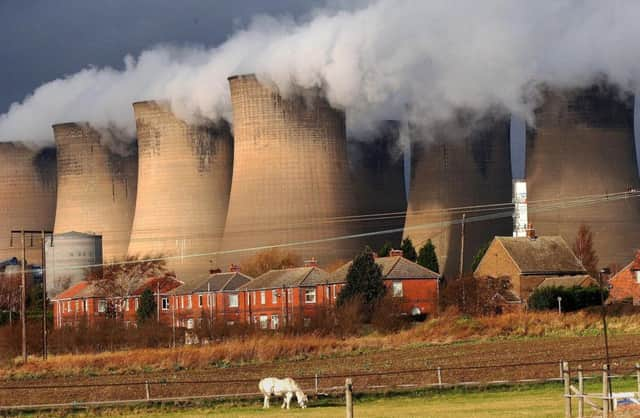Another coal lamp goes out in '˜Megawatt Valley'


Its closure, following that of Ferrybridge C in 2016, reduced the mighty “megawatt valley” around the River Aire to a single filament.
The plug was pulled on Eggborough, in the hinterland of Selby, after its failure to secure funding for this year and next through the “capacity market” which pays suppliers to be available as a hedge against the light going out.
Advertisement
Hide AdAdvertisement
Hide AdWith its present contract ending in September, its owners said it would “cease to be economically viable to continue operations”.
Eggborough says it supplies five per cent of the UK’s power, although the total contribution from it and the six remaining coal-only stations was only nine per cent in 2016.
It had been built in the first half of the 1960s, to use coal from the surrounding pits, and at its peak could supply enough power for every home in Leeds and Sheffield.
But the coalfields have gone, and with the gravitation of Yorkshire’s energy production from fossil fuels to cleaner, renewable sources, plants like Eggborough have fallen from fashion.
Advertisement
Hide AdAdvertisement
Hide AdThe coalition government’s carbon tax, introduced in 2013, which placed a minimum tariff on emissions from power stations, put the writing on the wall for Eggborough, as well as Ferrybridge. Its owners warned two years later that the tax, combined with falling power prices, meant it would be unable to cover its future operating costs.
Yesterday’s confirmation, which put 130 jobs under threat, leaves only three units at Drax – the third point on the triangle that marked out megawatt valley on the map – producing power from coal in Yorkshire.
The fuel’s phasing-out is one of the Government’s flagship environmental policies, and tighter emission limits from 2025 will squeeze the market further.
Adam Booth, Eggborough’s managing director, said: “With the age of the plant and the current Government’s policy, Eggborough has been under threat of closure for the past few years.”
Advertisement
Hide AdAdvertisement
Hide AdThe plant, he said, had “a proud history of generation and a dedicated and skilled workforce”.
Plans have been lodged for a new, 2,500 megawatt gas-powered plant on the site, which could meet the electricity needs of around two million homes by the early 2020s.
But campaigners say the future for energy generation lies instead in developments like the vast wind farms under development off the Yorkshire coast
Dominique Doyle, a lawyer at the pressure group ClientEarth, said of the gas project: “It’s crazy that one of the UK’s biggest fossil fuel polluters plans to strip its site only to construct a new mammoth fossil fuel installation. We need a strong vision from the government of what happens beyond coal.”
Advertisement
Hide AdAdvertisement
Hide AdShe added: “Curtains for coal must not be a free pass to switch these plants to giant gas units.”
However, Coun Mark Crane, leader of Selby Council, said the Eggborough site remained “an area of investment” and that the closure would not affect future plans.
Mike MacDonald, of the engineering union Prospect, criticised the Government for a “short-term approach” to energy supplies, which, he said, pushed up retail fuel prices by creating uncertainty in the market.
He said: “Eggborough was never given the incentive to invest in clean coal technology. Whilst we fully support a move to a low carbon energy system, the speed of change cannot be allowed to cause hardship for those working in the industry.”
Advertisement
Hide AdAdvertisement
Hide AdSuch is the shift away from fossil fuels that last year, for the first time since the Industrial Revolution, Britain’s lights were kept on for a full day without the use of any electricity generated from coal.
Yorkshire’s East Riding is England’s most productive area for wind power generation, and with the development of the huge Green Port initiative in Hull, unemployment in the area is said to have fallen by 12 per cent.
An industry conference last June heard that the region was sitting on an offshore resource that would make it the “Saudi Arabia of wind”.
Three decades ago, the county had 56 collieries. The last two, Kellingley, near Pontefract, and Hatfield, in Doncaster, closed in 2015.